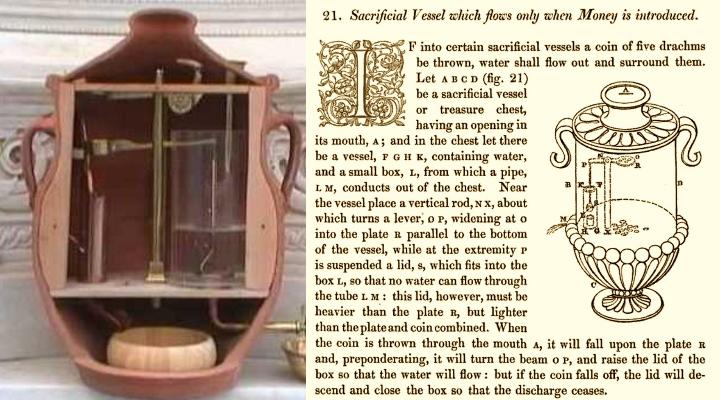[Greek] αὐτόματος (automatos), [Latin] spontaneitas: acting of one’s own will, of its own accord, of itself, spontaneous, automatic, of oneself, self-moved, by itself, without any cause, automatically, moved by one’s own impulse, capable of self-movement; Mk.4:28, Act.12:10

Heron of Alexandria (10-70 A.D) invents the first coin operated machine dispensing holy water
Background Information:
Ancient Greek History: In this time period, this term is used in the sense of being left to oneself, being a category of causation, and being automated. Aristotle (384–322 BC) lists this as one of the three categories (natural, artistic, and automatic) of causation. Socrates (470-399 BC) refers to himself as a self-taught (automatos) philosopher. Plato’s Protagoras, a dramatic masterpiece, refers to sons left on their own (automatos) being unschooled, uncivilized, and lacking manners. Heron of Alexandria (10-70 AD) was the inventor of the first coin operated machine dispensing holy water.
Old Testament: This term is used in the sense of spontaneously producing, growing of itself, and falling by itself. This is a signal for God’s grace, referring to the free growth of the Sabbath year. This term is traditionally used to describe what springs up by itself in the second year and could be served as food and eaten when no grain could be sown. The aftergrowth (spontaneously producing) of your harvest you shall not reap (Lev.25:5). You shall eat the aftergrowth, next year, what grows of itself (2 Kgs.19:29). Like ears of corn falling of itself (Job 24:24)
New Testament: This term occurs only two times in the New Testament, having the sense of being self-caused and without evident cause. In order for the disciples to understand, Jesus presents a parable of a good seed like the kingdom of heaven. Of its own accord, the seed yields fruit by itself. The kingdom of heaven grows apart from human efforts. Peter, imprisoned and chained, seeing an angel, finds himself unshackled. Then the iron gate opens by itself.
Scripture:
“They passed the first guard, then the second, and came to the iron gate leading to the city, which open for them by itself.” Act. 12:10
The angel frees Peter from captivity. Peter follows the angel was able to pass through the gate out of the city.
“Of its own accord the land yields fruit, first the blade, then the ear, then the full grain in the ear.” Mk.4:28
Jesus presents a parable likening the kingdom of heaven like a good seed. The kingdom of heaven grows by itself, without need to human efforts.
Conclusion:
Automatic, automaton, spontaneous, spontaneity
It was interesting to discover the wide variety of nuanced uses of this term in ancient Greek history. So I guess it is not surprising that this term could be used in a positive and negative sense. I was also not aware of the early Greek technical genius of Heron.
I noticed that there is quite a stark difference in the use of this term from the Old Testament to the New Testament. The Old Testament primarily deals with agriculture. However, the New Testament uses this term in more profound ways in the workings of the kingdom and the Holy Spirit.
An android is essentially an automaton resembling a human being in form and movement. This term was first coined in 1837 by Francois Rabelais during the Renaissance. In the Enlightenment, the working class person, poor and outcast, devoid of freedom and economic opportunities, were also called automatons.
